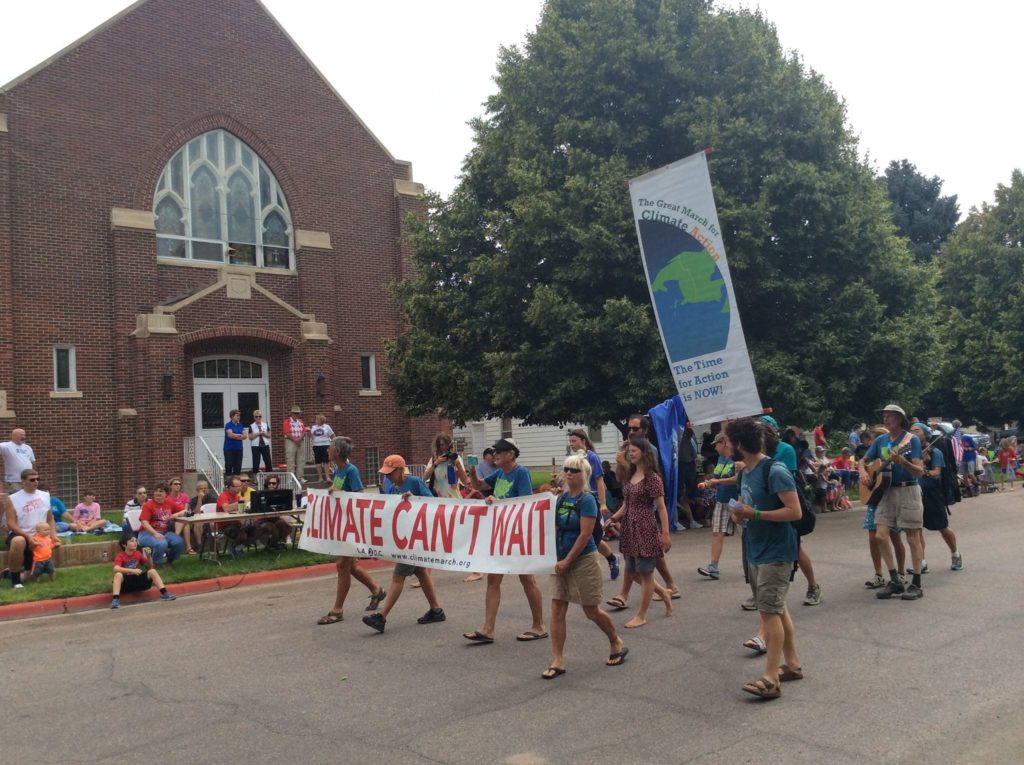by Toni Messina, July 6, 2020 (published in Above the Law)
Click here for original article
I met Ed Fallon when we were both in our early 20s. I was looking for a third roommate in my run-down, three-story, sloped-floor apartment in Somerville, Massachusetts, on the border of Cambridge.

He was an itinerant musician, believer in all causes to save our planet, and general nice guy. We campaigned against nuclear power together, and I followed his trajectory as he grew from farming his family property in Ireland, to winning a seat in the Iowa house of representatives, to hosting a radio talk-show and, in the past few years, to organizing the longest climate-change march in history.
In 2014, Ed got together 50 people to walk across country from Los Angeles to Washington, D.C. Their efforts were aimed at bringing a discussion of climate change to the people they’d meet along the way. The trip was at once exhilarating, litigious (some group members turned against each other and ultimately voted Ed out as leader), and dangerous, single-filing it along narrow highways, camping along roadsides and in deserts and mountains exposed to both extreme heat and brutal cold. Some 25 made it all the way on foot to D.C., hoping to meet with President Barack Obama. (They met with his key climate staff, instead.) While Ed had been involved in environmental issues most of his life and in climate activism since 2007, he figured he had to do something bigger and more attention-grabbing.
The national climate march was a grueling cross-country trek that drew scattered media attention, required exhaustive planning, cost half a million dollars and, arguably, left the climate no better than before the walk started. You can read about the drama, pathos, and wisdom in Ed’s book, Marcher, Walker, Pilgrim, which I recommend.
Yet, according to Ed, its participants — those who made it by foot, and those who joined along the way — have become lasting save-the-earth guardians. Most continue their work in their communities today.
Social change isn’t easy. It comes in fits and starts and takes concerted effort and planning. I contacted Ed in light of the recent BlackLivesMatter demonstrations to see what advice he’d give those addressing current social justice issues. Although different than climate change, Ed sees a connection.
Here are some excerpts from that chat.
Toni Messina: You spent nine months walking across the U.S., getting sick, and barely making it. Yet, climate change issues are barely better than when you started. Did you reach your goal or was the march a failure?
Ed Fallon: Change doesn’t happen overnight. We spoke to people from everywhere, small towns to big cities. The smaller places were the most rewarding. In one 60-person town in western Nebraska, everyone came out to our campsite to have dinner and talk with us. If we changed one mind, it was worth it, though we changed many. One person might then talk to another, who would speak to another, then another. Eventually the message gets out and spreads. This is a long-term challenge. There’s no change overnight.
TM: What do you think made the biggest difference in communicating with people?
EF: The walking was particularly useful. We’d show up on Main Street, some of us playing instruments. We’d go into local diners and bars and talk to the waitress or the guy at the bar. They’d be curious. Why were we doing this? Who were we? How long did it take? Why were we on foot, especially in a country that’s in love with their cars. Making a one-on-one connection with people helps them see you’re not so different from them. Even if they didn’t agree with us, everyone respected the commitment we made to walk. That alone was meaningful.
TM: Do you see an intersection between climate change and Black Lives Matter?
EF: Definitely. The people most hurt by climate change are people of color and the poor. In all the cities we walked through and in some rural areas, like the Native lands in New Mexico and the sandhills of central Nebraska, the power plants and factories were in their backyards. Nobody with money wants that. Pollution impacts the health of poor people most. They’re the ones living near the factories or working in them. They’re the disposable underclass. For a country obsessed with making money, you need a disposable underclass for capitalism to exist. Even in my state, Iowa, where we don’t have a large black population, a majority of the people working in the meatpacking plants are immigrants from Central America and Africa. Those packing plants have also been the location of Iowa’s most serious outbreaks of COVID-19.
TM: If you could give any advice to organizers of Black Lives Matter, what would it be?
EF: There’s a lot of overlap between social justice movements and environmental issues, and not just climate change. People should think beyond the immediate reach of their group or message and broaden the view to groups of all kinds fighting for change. These aren’t separate things — the economy, climate change, social justice, education, inequality, health care. They all affect each other. The primary problem is the focus our country puts on consumerism and capitalism above all else.
Ed may not organize another march the size or scale of the walk across America, but he feels it’s changed many lives, including his. “Walking, thinking, contemplating, slowing down to meet with people where they live and work — these are activities we should all do more of.”
“Change never comes easily. It takes concerted action and energy. But anything that brings the issue to the forefront of public discussion is a step in the right direction.”
Ed’s book, Marcher, Walker, Pilgrim, is available at www.boldiowa.com/marcher-walker-pilgrim/.
(Toni Messina has tried over 100 cases and has been practicing criminal law and immigration since 1990. You can follow her on Twitter: @tonitamess.)
